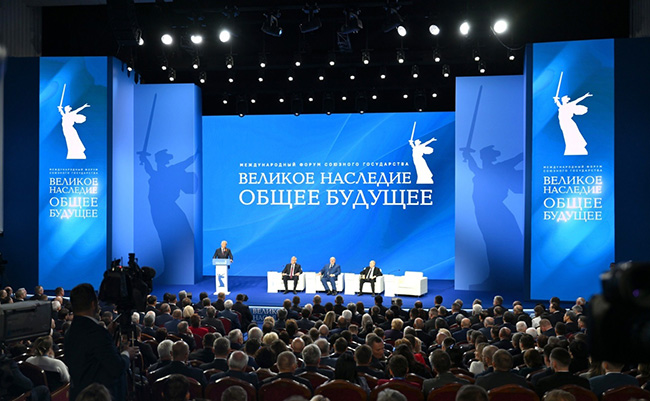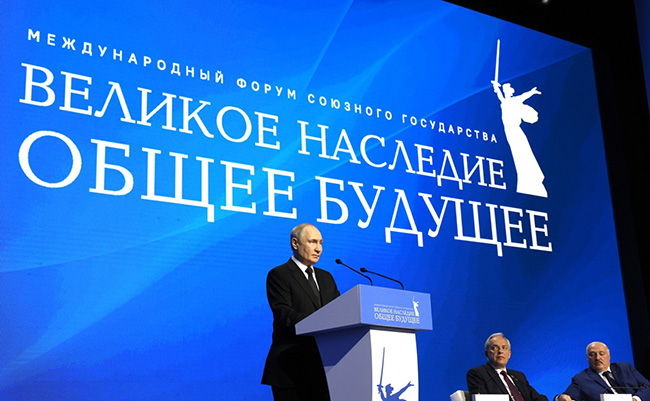 Plenary meeting of the “Great Heritage, Common Future” International Forum of the Union State.
Plenary meeting of the “Great Heritage, Common Future” International Forum of the Union State.
Photo: Kremlin.ru
The presidents of Russia and Belarus took part in the plenary meeting of the “Great Heritage, Common Future” International Forum of the Union State. April 29, 2025. Volgograd.
The Belarusian President Alexander Lukashenko, Speaker of the State Duma Vyacheslav Volodin and Speaker of the House of Representatives of the National Assembly of the Republic of Belarus Igor Sergeyenko also took the floor during the session.
Organised by the Parliamentary Assembly of the Union of Belarus and Russia, the Forum was timed to coincide with the 80th anniversary of the Great Victory. It brought together over 450 delegates, including leading international experts, civil society leaders, government officials and youth representatives.
 Photo: Kremlin.ru
Photo: Kremlin.ru
Remarks by the President of Russia at the plenary session.
President of Russia Vladimir Putin:
Mr Lukashenko, friends.
I would like to greet you on this heroic and sacred land. It would not be an exaggeration to say that this land is sacred for all the people of Russia, and for all the people of the former Soviet Union, too. It is here that the Great Heritage, Common Future International Forum is taking place.
Organised by the Parliamentary Assembly of the Union of Belarus and Russia, the event brings together speakers of parliaments, chairs of parliamentary committees, civil activists, researchers and experts from about 20 countries, just as the Speaker of the Russian parliament [Vyacheslav Volodin] has just mentioned. It is important that foreign participants come from former Soviet republics, as we have just heard, and also from Southeast Asia, Europe and Latin America.
Mr Lukashenko and I were unanimous and sincere in our effort to support the initiative to hold this major gathering at this high level. Taking this opportunity, I would like to thank President Lukashenko for coming here and joining us.
It is symbolic that this forum is taking place in the Hero City where the fate of the entire world was once decided. The President of Belarus and I visited the Mamayev Kurgan memorial complex to honour the memory of those who defended the city and achieved immortal glory in the battles for Stalingrad. They stood their ground until the bitter end, just as the heroes of the Brest Fortress, and the defenders of Minsk, Leningrad, Sevastopol and other cities and borders of our country. We discussed this on our way here.
The fortitude and courage shown by the Red Army soldiers, the unity of the entire multiethnic nation became a formidable force. The enemy was halted and routed on the banks of the Volga. A decisive blow was dealt to the Nazi war machine, turning the tide of the war and clearing the path to the West, to Berlin, to the Great Victory, the 80th anniversary of which we will be celebrating very soon, on May 9.
Victory Day is one of the most significant holidays, held sacred in Russia as well as in most former Soviet republics. During the war, our nations went through the most bitter trials together, but they defended their independence and future. The defeat of Nazism is our shared legacy.
We are expecting the leaders of a number of states at the celebrations in Moscow. We highly appreciated many countries’ decisions to send military crews to march shoulder to shoulder with Russian soldiers at the Victory Parade on Red Square.
This forum is making good progress. It has featured several discussions on highly important subjects such as the preservation of historical memory, common moral and spiritual values, and educating younger generations as true patriots, responsible and loyal to their Fatherland.
I am certain that such principled approaches are shared not only in Russia and Belarus, but countries represented at the forum. All our countries are making efforts to preserve the truth about the Great Victory, including with the meaningful contribution from legislators.
On April 9, Russia adopted a State Duma-sponsored bill, the federal law on the perpetuation of the memory of the victims of the Great Patriotic War. The new legislation helped improve the legal framework, provided new opportunities for collaboration between the state, public organisations and citizens to preserve the memorials of our fallen soldiers, expanded support for the search movement that has just been mentioned here, and research projects related to the history of the Great Patriotic War, and facilitated the construction of monuments and the opening of new museums.
In total, more than ten federal laws have been adopted in Russia in recent years related to history and memorial issues. New days of military glory were established in honour of the Crimean offensive operation in 1944 and the Battle of Leningrad in August 1944. The procedure for renovating and protecting cultural heritage sites has been streamlined.
We also express our gratitude to the deputies of the Parliamentary Assembly of the Union State for their active participation in this work, including the proposal to allocate part of the Union State’s budget for the construction of a memorial complex in the Kursk Region dedicated to the Battle of the Fiery Kursk Bulge, as well as for erecting a monument in Mogilev District near the village of Buinichi. It was here in July 1941 that fierce fighting occurred, where soldiers halted and incinerated German tanks – a feat immortalised forever by our eminent writer Konstantin Simonov, an eyewitness and participant in those events. Many in this hall know that the book The Living and the Dead narrates these very events.
I believe that this shared work of ours must be conducted on a permanent and systematic basis. In this regard, I propose establishing the Parliamentary Assembly’s Commission on Historical Memory Preservation. Given the authority and influence of deputies from our states, its primary task, in my view, should be to consolidate public and political forces, our citizens – particularly young people – around joint projects aimed at safeguarding the historical truth about the Great Patriotic War, the Second World War, and the heroic deeds of the Soviet people. Naturally, the commission’s work must involve leading experts and historians from our countries.
I would also note that many participants of the current forum actively collaborate with the Parliamentary Assembly of the Collective Security Treaty Organisation (CSTO). We are grateful to all who contribute to the legislative support of constructive partnerships among CSTO member states, the harmonisation of national laws, and the development of model regulatory acts, including those pertaining to historical memory.
In particular, the Assembly has adopted model laws and recommendations on legislative measures addressing accountability for attempts to revise and distort historical events and outcomes of the Great Patriotic War. In December 2024, it also issued an appeal to the parliaments of all nations in honour of the upcoming Victory anniversary.
The Interparliamentary Assembly of the Commonwealth of Independent States (CIS) likewise delivered an address marking the 80th anniversary of Victory. For over three decades, CIS deputies have engaged in constructive dialogue, exchanging experiences and successful legislative practices on this platform.
As you know, 2025 was declared the Year of Peace and Unity in the Fight Against Nazism in the CIS. Many countries are holding memorial, social, cultural and educational events, such as the Immortal Regiment march, which has become nationwide. This is our tribute to the memory of our servicemen who perished during the war and an expression of our deep gratitude to our veterans, the generation of winners – our fathers, grandfathers and great-grandfathers.
Friends,
We are all aware of the unfathomable price our peoples paid for victory over Nazism, and immense sacrifices we made. There is no doubt that people in Russia, Belarus and other countries will never forget the lessons of that war.
The main of them is obvious: we must do everything in our power to fight against the revival of Nazism and the proliferation of destructive ideologies, namely, Russophobia, antisemitism, national and religious intolerance, as well as the so-called exceptionalism, which camouflage claims to global domination and attempts at pressure or interference in the internal affairs of sovereign states.
It is also important to work together to form a more just multipolar world order based on respect for the interests of each other and the right of every country to its own development pattern. It is on this basis that Russia is developing its partnership with Belarus and all the other countries that are taking part in this forum.
We firmly believe that the global community should join forces to create a new architecture of equal and indivisible security, which would safely protect all states without detriment to the interests of others. This is especially important for Eurasia. Our common continent must become a territory of peace and stability and an example of sustainable economic, social and humanitarian development.
We presume that this new architecture could be based on the existing multilateral cooperation formats, such as the Union State, the CSTO, which I have mentioned, the CIS, the Shanghai Cooperation Organisation, BRICS, ASEAN and other respected and influential organisations.
In conclusion, I would like to once again express gratitude to the organisers of this meeting and to all its participants for their constructive work and substantial contribution to the strengthening of interparliamentary ties between our countries.
Thank you.
read more in our Telegram-channel https://t.me/The_International_Affairs

 19:40 29.04.2025 •
19:40 29.04.2025 •






















